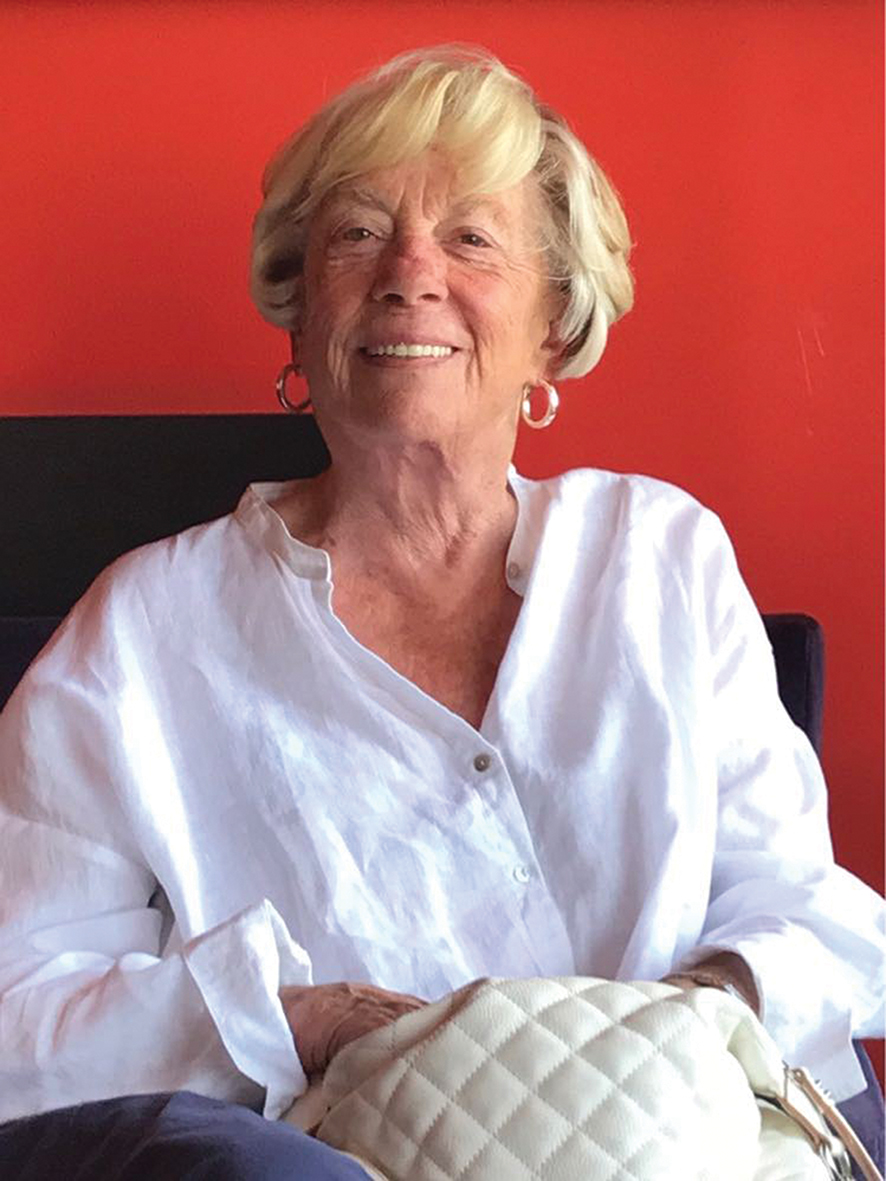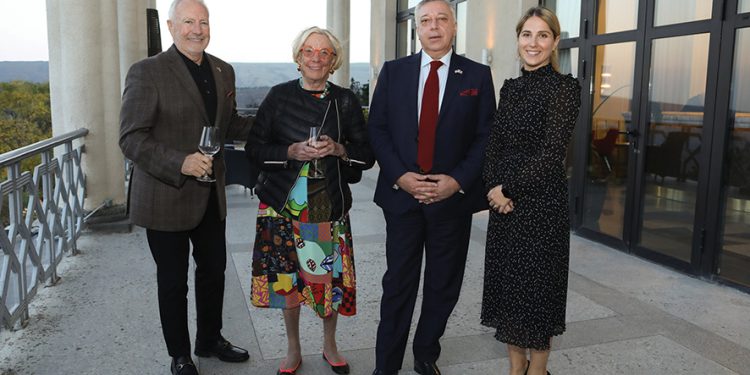Betsy Haskell has lived in Georgia since the 1990s, has started four successful businesses, and is currently enjoying her retirement in Tbilisi. She has been the Georgia Contractor for Metrica, Inc., a US Treasury Department sub-contractor, the name and brains behind the beloved “Betsy’s Hotel,” and played a leading role in getting the renowned American Chamber of Commerce on its feet, continuing today as it ex-officio advisor. With AmCham having just celebrated its 25th anniversary, GEORGIA TODAY sought to find out more about one of its leading founders.
“Shortly after Zviad Gamsurkurdia was elected the First President of Georgia after the break-up of the Soviet Union in 1990, I was working as Executive Director of the American Council of Young Political Leaders, a Washington, DC, USIA-funded non-profit which organized visits to the US for 180 countries’ young elected officials, and visits to those countries by young American-elected officials,” Betsy tells us.
“One day, a physician from Georgia visited me and asked if Georgia could become a member- it had formerly been part of our partnership with the Soviet Union. When I asked why they wanted to do so, he said that they were looking for USAID funding for the new government, which had very little money. Since the Board of the ACYPL did not want more small country members, I suggested another way to get funding- to develop a group of US businessmen who would partner with each Ministry of the Georgian government to bring pressure on USAID to fund projects they would deem worth funding.”
Through AmCham, we recommended that more emphasis be put on the importance of the private sector and its value to the country’s economy
The physician, Dr. Archil Kobaladze, returned to Tbilisi and presented the idea to the President, who asked him to invite Betsy to visit Tbilisi to discuss the proposed project.
“As it happened, I arrived one week before the civil war broke out, and the President fled the country,” Betsy says. “However, during my visit, in addition to the President, I met with the Prime Minister, Tengiz Sigua, who, after the war ended, joined the 3-man junta then running the country and was anxious to pursue my idea.”
Betsy went on to sell the idea to 22 retired former executives of big and small US businesses, persuading them to come to Tbilisi to spend a week with the Georgian ministers, learning about how the ministries worked.
“The idea was that then we would all sit down together to discuss what they had found, and listen to their recommendations, and local business people would also be invited to participate. In the end, about 150 people met to discuss what had been learned and recommendations for ways to adopt more effective operations of the ministries, and the important role of the private sector,” she notes.
This was the first public/private conference of its kind held in the Soviet Union.
By the end of that second week, the conclusion was obvious: Too many people worked for the government, as that was seen as they only way to make money.
“We recommended that more emphasis be put on the importance of the private sector and its value to any country’s economy,” she says.

Promoting US-Georgian Relations
“As a result of the work I had done to create the Economic Advisory Project, I was asked by John Kluge, the owner of US based Metromedia Corp, if I would move to Tbilisi and live. He had invested in the Tbilisi TV Tower, and was anxious to expand TV programming in Georgia. Of course I said yes,” Betsy tells us. “However, it was clear that I needed to start a small business of my own here, and so, with two Georgian women friends, I founded Tbilisi Locators, an American style real estate firm.”
Embassies had begun opening, organizations like the IMF and UN were opening offices, and other large multi-national organizations were arriving, so business at Tbilisi Locators was brisk, as there was no other firm of its kind in Tbilisi.
“When I started Tbilisi Locators, the existing way to advertise available property was to check the trees near Deda Ena Park where people pinned the details of available flats!” Betsy notes. “When the US Embassy opened a year or so later, the administrator looked to me for guidance in various ways. By that time, the war in Abkhazia had started, Gamsurkurdia was wandering around in Western Georgia and threatening to come back to Tbilisi to take back the presidency, two members of the junta, one a General and one a warlord, were fighting with each other and Shevardnadze, and the one five-star hotel in Tbilisi, the Metechi Palace (now the Sheraton), was the only place for new Embassy staffers to stay.
“Because of the threat of Gamsurkurdia coming back to town, the owner of that hotel had asked the warlord to take over security at the hotel. This led to frightening events, as, if one of the General’s men came in, the warlord’s men would shoot at them. The Administrator at the Embassy wasn’t so worried that new staffers would be targeted, but stray bullets being fired back and forth might ricochet. For that reason, he asked me if I would find an alternative!” Betsy says.
Having found a good option which was approved by the Embassy, Betsy opened “Betsy’s Hotel” in 1994, which she operated until selling it in 2001.
From 1995-1996, Betsy worked closely with the American International Health Alliance, which was working with Emory University to begin to bring rationalization to the healthcare system in Georgia. Emory took over from AIHA in 1996, and Betsy continued to work closely with them as they studied ways to improve the system.
In 1995, the then US Ambassador to Georgia, Kenneth Yalowitz asked Betsy and Leigh Durland, then President of Absolute Bank (funded by friends of former US Secretary of State, James Baker) to start an American Chamber of Commerce in Georgia.
We wanted it to be an organization which went to “war” on behalf of members who had real problems dealing with the Georgian way of doing business
“Using copies of the Baku AmCham’s founding documents to guide us, we found that, in Georgia, to incorporate a new company, three officers were required, and so we asked Fady Asly to join us and were thus able to formally begin doing business,” Betsy says. “Leigh Durland hired Amy Denman to begin rounding up potential members and get the company going, and Fady found space in his office for her to work out of. Amy was brilliant at finding new members, and within a few months, we were able to have our first membership meeting. There was some disagreement between us over goals of the organization, though. In short, Leigh wanted it to be a social club of sorts, where people could gather for a beer and conversation after work, and Fady and I wanted it to be an organization which went to “war,” as it were, on behalf of members who had real problems dealing with the Georgian way of doing business. This led to a contested election between Leigh and Fady, which Fady won. Fady was re-elected President for the next four or so elections, and, today, the Chamber has over 200 members and a staff of six.”
Also in 1995, Betsy was approached by a US company called Metrica Inc. to be their Tbilisi representative to oversee their contract with the US Treasury Department to bring experts to Georgia to help the country set-up a proper financial operation.
“The work involved finding appropriate housing, arranging security, hiring and paying drivers and cars, furnishing their offices, etc. I agreed, and worked with them and their offshoot, Metrica Relocations, Inc., which has a contract with the World Bank to assist in all relocation activities for their senior staff. I was with them until I retired in the summer of 2021,” Betsy says.
In 1998, Betsy worked with the US Department of Commerce, which funded a trip to the US for a group of winemakers.
“There were huge problems in the Georgian wine industry that were impeding its development, and we decided to send this group to Canandaigua New York, where the largest wine distribution company in the world was located, and whose president had visited Tbilisi,” she tells us. “The similarities between the beginnings of New York State wine making and Georgian wine making were very similar, so it was felt that a trip to New York to visit the wine distributing company headquartered could provide useful information to the nascent Georgian wine industry.”
With so much under her belt, so many of developing Georgia’s ups and downs experienced first-hand, we are intrigued as to how she feels about Georgia now, thirty years on.
“I still love living here,” she says. “It was always wonderful to be helpful, and I’ve loved every minute of it. I had more projects in mind, investments in tourism infrastructure, but I decided to simply take pleasure in being retired, and I’m enjoying my friends and my garden. Georgia is a relatively inexpensive place to live, which is a big plus, and more and more the grocery stores are carrying new and useful products. But the traffic drives me crazy and the new construction seems to never end. It would be helpful if there was a city plan, but that kind of thing tends to go against the grain here. Medical care is good and not expensive if you’re a citizen, but if not, very high priced. Sadly, overall, I get the impression that this government doesn’t care much about its citizens and their quality of life.”
Interview by Katie Ruth Davies














